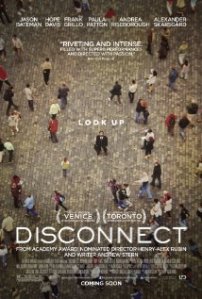- Like other films of its genre (Crash, Traffic, Syriana, etc), Disconnect uses an ensemble cast to show us how a given issue hurts society, in this case the issue being the risky ways we use the web. Therein is both the film’s biggest strength and its most glaring weakness.
- Let’s talk about the good first. Disconnect has the courage to delve, not just to scratch the surface, but to force us to immerse in its characters and its story arc. Cyber bullying, sexual exploitation and identity theft are not light-hearted or entertaining subjects, but Disconnect does not pull back to ensure the viewer remains comfortable watching it. In other words, it does right what flicks like A Dark Truth do wrong; it explores its message no matter how difficult it is, which gives the theme more potency.
- The problem is that Disconnect overreaches. Most of us use the web in healthy ways without negative side effect, and, in fact, technology is a boon for many. Because most people do not suffer like Disconnect’s characters, the film is less impacting than it might have been with a scaled down message.
- Writer/Director Henry Alex Rubin is at his best in the melodramatic cyber bullying plot. He and the magnificent actor Jonah Bobo make us feel Ben’s longing, isolation and pain, at the same time we feel Jason’s (an equally terrific Colin Ford) loneliness. Then, after the turn, Rubin shifts focus to Rich’s (Jason Bateman) guilt while mixing in strong doses of Jason’s and Abby’s (Haley Ramm) regret, as well. Again, we feel the characters’ pain, and again we feel the cautionary tale. Social media can have pervasive impact on our youth if adults in the children’s lives are not vigilant.
- Rubin is at his worst in the identity theft plot. He adeptly assesses the mundane ways in which thieves can access personal information, but then he carries events too far, not quite delving deeply enough into the characters to make us feel the motivations for their behavior.
- Narratively, Disconnect has a few too many characters. This is all the more evident when some of the characters disappear for most of the film’s second half while others are essentially added. I wondered what happened to Frye in the film’s second half even as I wondered why I didn’t know Haley better through the first. The number of characters makes it more difficult to identify with any of them. With fewer characters, Disconnect might have featured better character development, and better character development might have increased the power of the message.
- This film is slickly edited, weaving its three stories together with impeccable timing.
- The movie is also cleverly shot. The camera’s close proximity to actors creates intimacy we might not otherwise feel.
- The performances are outstanding, every one of them. Max Thieriot as Kyle and Frank Dixon as Mike shine, stealing the scene every time they’re present. Every other actor is also fantastic.
- The finale’s use of slow motion is over the top. It pushes the story’s melodrama too far and prevents us from empathizing with the characters. Memo to directors: slow motion does not create emotion. Letting your actors emote in live action does.
- While often uncomfortable and a bit too melodramatic, Disconnect is a well shot, well edited and superbly acted movie with some interesting observations about modern anxieties. But the movie reaches for more than its subject matter facilitates, which creates something of a . . . well . . . a disconnect with the viewer.
- Final Grade: C+
-
Subscribe
Subscribed
Already have a WordPress.com account? Log in now.
